Hello again. Just a reminder in case you missed the last post, that the events described here occurred several months ago, when Corona was still just a tasty Mexican beverage. We are now both safe and well in the UK, and taking the opportunity to write our story down. You may read it if you wish.
BOLIVIA, 22nd-31st December 2019
Dea was no better by morning. She was weak and dehydrated, and had got no sleep at all. Connaire offered her some of his spare water and some diarrhoea tablets, then prepared to set off alone. He still wanted to make it over the border into Chile before Christmas so that he could contact his family. It seemed unlikely now that Dea and I would be able to do the same. Of course he was a little reluctant to leave us, but I reassured him that Dea was rarely sick for very long. Any illness that had me bed-bound for a week, she would usually recover from with an afternoon nap. “We’ll rest here today and I’m sure she’ll be fine in a few hours,” I told him. And I felt like he was ready now to go it alone, to take on the world. Okay, I hadn’t passed on that much knowledge to him, but how much could I really teach a man who was able to fund his travels with a burnt-down house? Men like that don’t need lessons in fixing handlebars with steak knives. I wished him well, and waved him goodbye.

After a few hours Dea wasn’t much better and I decided I was going to have to do something. We didn’t have an awful lot of water left and, despite the previous night’s heavy rainfall, the riverbed remained dry. There was a village nineteen kilometres along the road where we had planned to get water, and I decided to cycle there, see what other help it might also provide, and come back with supplies. Hopefully Dea would be well enough to ride there herself the next day, or I could investigate organising a lift if that was necessary. Dea was still lying in the tent, so I left her to try and get some sleep, and rode quickly in the direction of Arichia. Without the weight of my bags I could go faster than normal, and I tried to ignore the bone-jarring bumps as I raced over them, not wanting to leave Dea alone for longer than was necessary. I was soon in Arichia. I had hoped to find chemists and hotels, a place Dea could rest and recover, but it was nothing but a sleepy village, and a very poor one at that. Old people hung about looking glum, as if there was nothing to do in the middle of nowhere except sit and wait. I found a few shops, and managed to get bottled water, coke, and bananas, but bread was another matter. I went all over the place looking high and low for it, until a kind woman took pity on me and led me to the right shop. I thanked her, and sped back towards Dea as fast as I could.
A fresh pile of vomit greeted me outside the tent. Dea was no better than before, and the tent was starting to grow hot from the sun. Looking for a solution, I went outside and found the plastic tarp we were still carrying, the one we’d bought in Peru when we lost our old tent flysheet. I went over to the riverbed and strung the tarp up over it the best I could, tying it to rocks and branches. I helped Dea out of the tent and down to the riverbed, where it was now shaded and cool under the tarp, and lay her down on some sleeping bags. But still she couldn’t sleep and still she felt awful. She had started taking some general antibiotics we were carrying, but they hadn’t yet provided a miracle cure. I sat with her for a while, and she told me she was thinking about taking a lift. It made sense to me. Of course she wanted to get a ride out of this horrible situation, although I hadn’t seen anyone in Arichia that looked like they had the means to help. But Dea didn’t just mean out of here, she didn’t just mean to the Chilean border. “My body is just telling me it’s had enough,” she said, tears in her eyes. “All these problems we’ve had. That we keep having. I just can’t take it anymore.”

But after a good night of sleep Dea was feeling a little better the next morning, and believed that she would be able to cycle, at least as far as Arichia. But before we had even left the tent a man suddenly appeared outside. Beneath a wide-brimmed hat sat the face of a round, jolly peasant. He wore a blue check shirt over the top of a woollen sweater, and his trousers were held up with rope rather than a belt. He was very friendly, and even invited us for coffee at his house, which was apparently nearby. Until now we’d seen no one here other than an old woman who herded her llamas past in the mornings and evenings – this man’s wife, perhaps. Coffee wasn’t something Dea’s stomach was crying out for, so we politely declined the invitation, but the man wasn’t done chatting, and laid down on the ground outside our tent door. Upon hearing of Dea’s poor health, he recommended to us that there was a bigger town back the way we had come. We had been surprised when we’d crossed a paved road on our way here, and he told us that if we returned to that and followed it, we would come to this wonderful-sounding place in just thirty-five kilometres. “It’s got hotels, restaurants, shops with lots of food,” the man said. It sounded too good to be true, but we checked the map and there was indeed a point marked where he said, named Santiago de Machaca. We thanked the man. It really was great news. He’d been so helpful, and so friendly and kind, and my God, I only wished I’d covered up that pile of sick before he’d decided to lie on the ground.
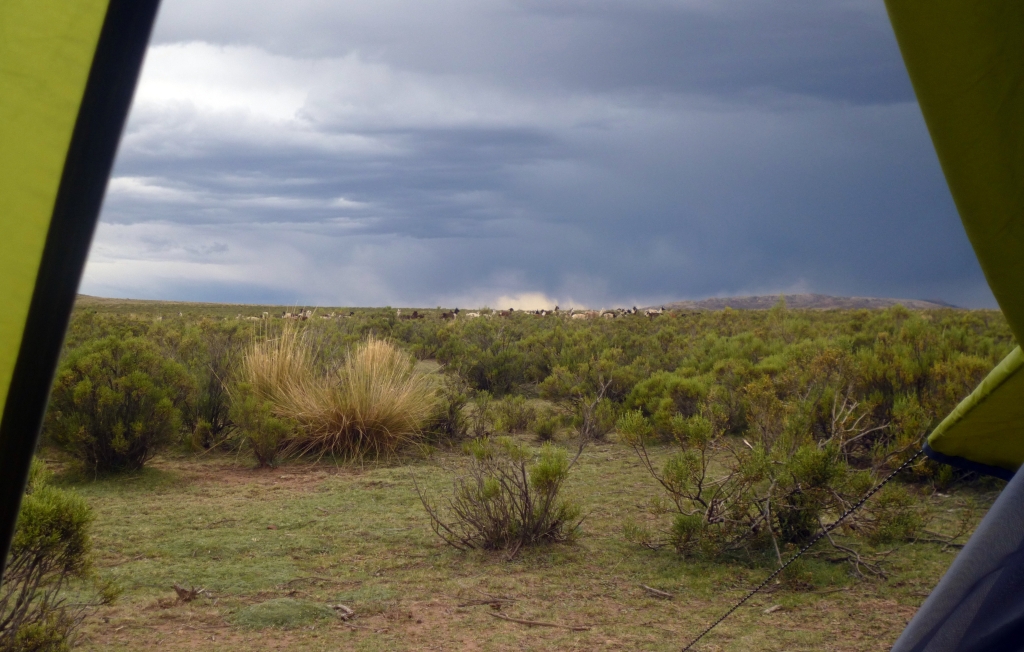
I packed some of Dea’s things into my bags, shifting as much weight as I could onto my bike to make things easier for her, and off we went. She was still not able to eat much in the way of solid food, but with some flat coke and juice she found the energy to navigate the puddles of the dirt road back towards the paved road we’d crossed some fifteen kilometres back. The most dramatic problem along the way actually occurred not to her, but to me. Dea was ahead of me when my bike got stuck in some mud and I lost my balance. I felt the heavy bike begin to tip to the left, but on that side of me was a ditch. I instinctively knew that I wasn’t going to be able to put my foot down anywhere near well enough to hold up the overloaded bike, and instead tried to bail out, diving away from the bike as it fell. Alas, my left foot became pinned beneath the fallen bike. I was trapped. I cried out for Dea, who dropped her own bike and came running back to help when she saw what had happened. I was not in pain, but my shoe had come half off, and it must have looked to her like my foot was all twisted. A broken ankle now would have put us in a real pickle. She helped raise the bike off me and I jumped to my feet to show her that I was completely fine. Still, I gave my bike a nasty look for choosing this inopportune moment to try to kill me.



After twelve kilometres we reached tarmac, and what a road it was, with a very wide shoulder and basically no traffic whatsoever. Suddenly our progress was much faster and it wasn’t long before Santiago appeared upon the horizon. Alas, this was a trick of the wide open empty plains, and it took what felt like an eternity to actually get to it. Dea was deteriorating all the while. She was putting in a superhuman effort, the thought of the nice town that the man had described keeping us motivated. Eventually we reached our goal, but the dusty, empty streets were not what we’d hoped for. We continued through them to the town centre. Here we came across a typical plaza surrounded on all sides by buildings. To our immense relief a few of them were marked as hotels and even looked quite nice. To our immense disappointment they were all locked up. The few locals around eyed us suspiciously and could give us little help in finding the owners of any of the hotels, until finally a more-friendly woman at a shop told us she was related to the owner of one, and offered to call her for us. Alas, she was in La Paz and wouldn’t be back until the following day.
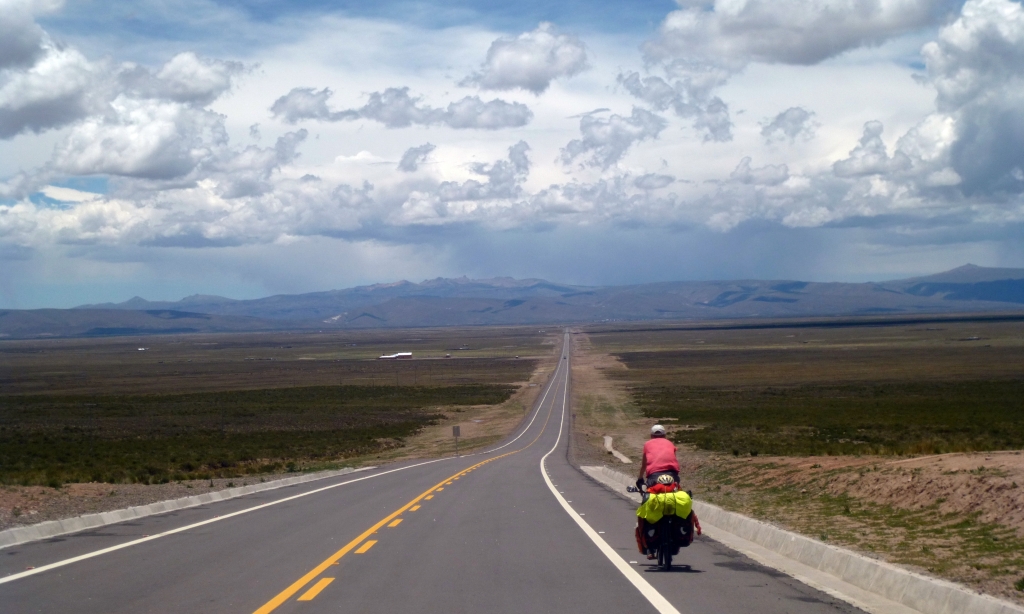
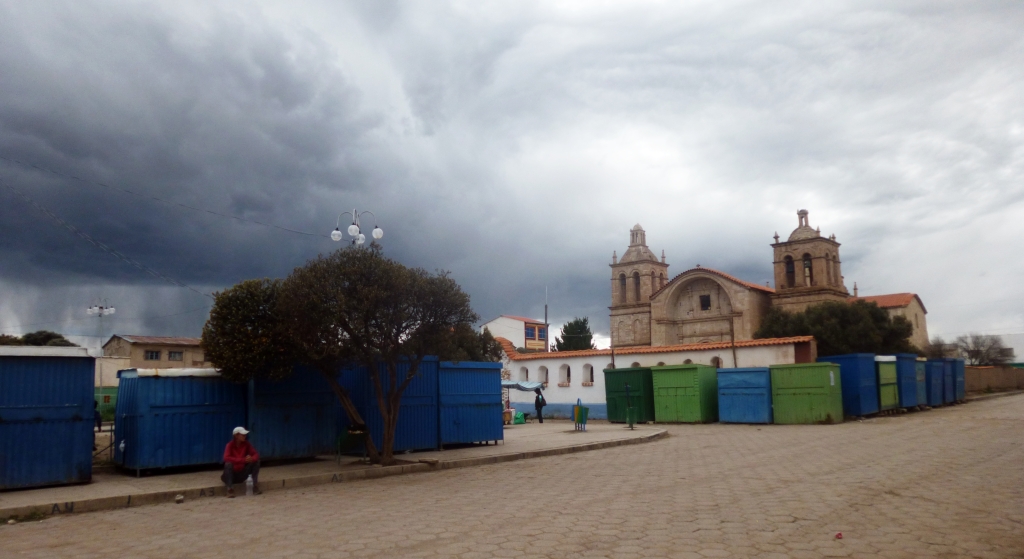

We were forced to sit in the plaza and wait through the afternoon. This was absolutely not what the increasingly poorly Dea needed. All she wanted to do was lie in a bed, and yet even that was not possible. And the hotels were not the only disappointment; the many little shops were also rather lacking in appetising food, the internet cafe was closed, the one little restaurant not looking like somewhere we’d ever want to eat. So we sat in the plaza and waited. Dea laid down and tried to rest despite the local kids who started kicking a football around, while I went around again and again to each of the hotels to bang on the doors and ask anyone nearby if they had any idea how we could possibly exchange money for a place to sleep in this town.
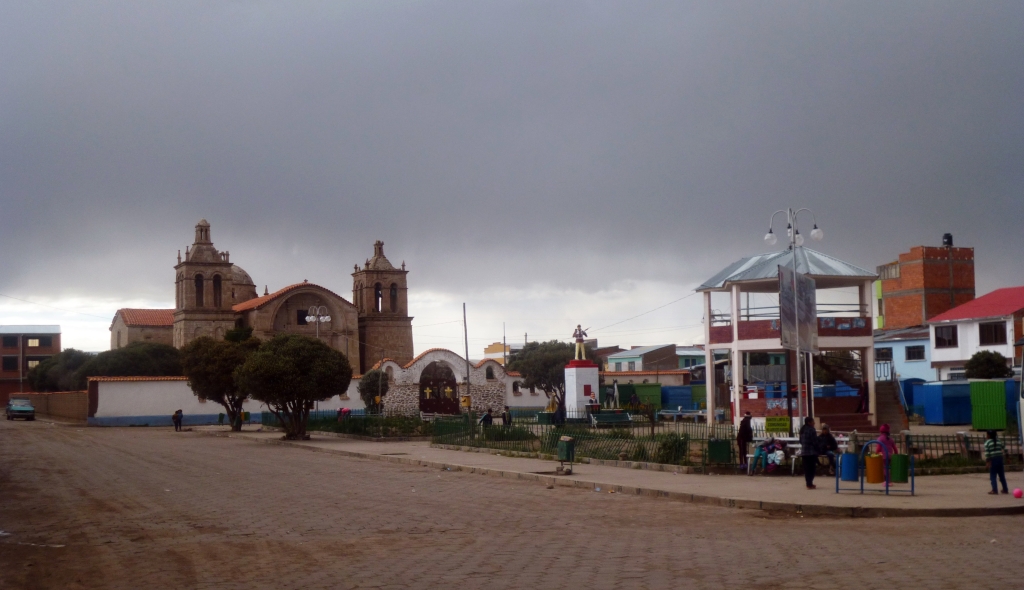
It was really becoming an awful situation as the hours passed and dark clouds rolled in. We were soon going to get a good soaking to add to our woes. I tried again with the friendly shop owner. She was the only person in town who seemed at all keen to help, and as she was related to the hotel owner and the hotel was connected to her store, she eventually found a way to access a room for us, which I believe might have involved a little bit of breaking and entering. I didn’t care, we finally had a place to stay. I helped the exhausted Dea up the two flights of stairs to the room, then carried up all of our gear, doing my best to ignore the dried llama foetuses that were hanging up from a window frame at the foot of the stairs. I think there is something about them that is supposed to be lucky in Bolivian culture, though that’s not the feeling I got from them. Once Dea was settled in I went back out to look for some rehydration salts at the town pharmacy, and to get online at the internet cafe. It was now open, but the man explained that there was no internet. We’d been told by someone in Desaguadero that the government had cut the internet due to the recent civil unrest, and so this was not a big surprise. It was the evening of the 23rd of December, and it looked like we were going to be stuck in this middle-of-nowhere town for a few days, with no way to contact the outside world. I sighed and headed back to the hotel. I made myself some pasta for dinner and got ready for an early night. Then Dea sat up saying she felt really awful. I grabbed her a bag I’d prepared and she threw up into it. Unfortunately this bag was not as watertight as I’d thought, and I was soon carrying it away to the sink on the ground floor as fast as I could. As I then wiped sick off the dark stairs, moonlight catching the outline of the creepy dead llamas above my head, it struck me that this was going to be, if not a Christmas to remember, certainly not one I would soon forget.
The next two days were spent at the hotel, which actually wasn’t too bad. It was very quiet, us being the only guests, and we had some big windows in the room which provided plenty of light. Occasionally I would go out for some food and water, and to check if the internet place was open, which it never was. Dea remained unwell, but gradually improved with the help of some antibiotics. I’d never seen her so ill before and it was yet another indication that we were perhaps pushing ourselves a little too hard. Once again the topic of whether we would really be able to cycle all of the way to Buenos Aires by the beginning of March came up. More time was of course being lost, but I still felt like it was possible, and there was nothing else to do but take things one day at a time and try to remain positive.
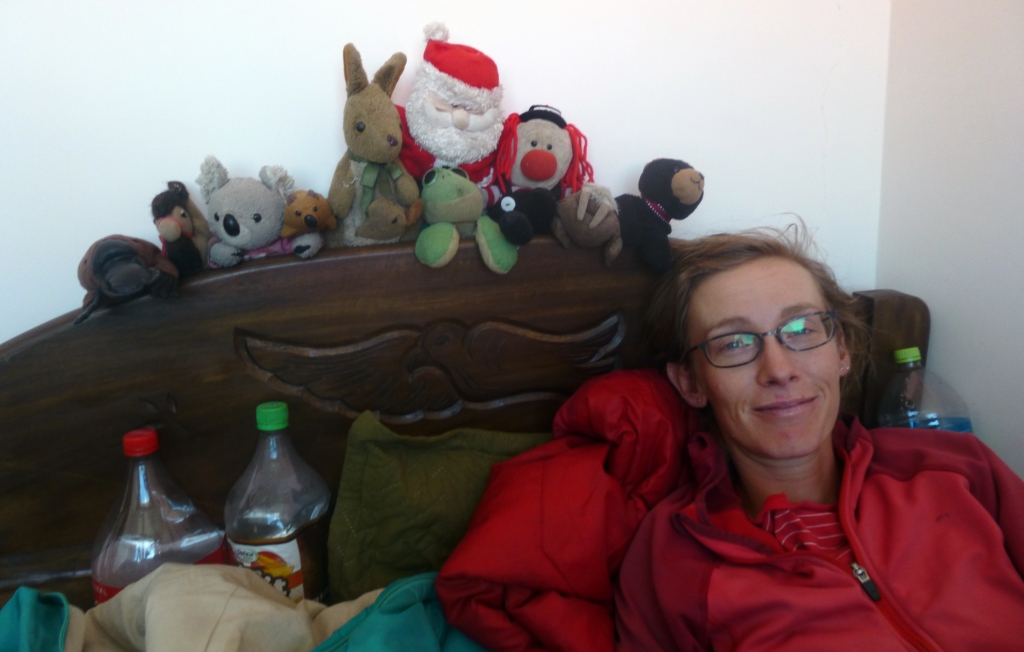
I woke up on Boxing Day and went down to do some cleaning and maintenance on the bikes in the yard behind the hotel. Dea hadn’t slept well and was having a lie-in, but after a little while she came down the stairs saying she was really hungry. She had a big breakfast for the first time in days, and then said she was feeling great. The classic Dea-instant-recovery had taken a few days longer than normal to kick in, but now at last she’d sprung from bed-bound to ready-to-go in an instant. We decided that there was no point in delaying further, and got back on our bikes. Neither of us had any great desire to spend more time in this town than was absolutely necessary.
Chile was only eighty kilometres away and it felt great to be back on our bikes and riding off towards it across the altiplano again. Of course our route had changed, but there was actually a road directly from here to the border we’d originally been aiming for, and it was a road that took us through scenery much more spectacular than we’d have probably found the other way. “It’s like a mini-Utah!” Dea exclaimed, as we weaved through the interesting rock formations, and it was just great to see her so well and so happy again.



At one point I stopped to admire the views and take a drink of water. As I stood straddling my bike, the front swung around suddenly under the weight of my basket. As I was busy drinking water I was not ready to stop it, and it was quickly out of my control, the front wheel rolling to one side and the heavy bike falling to the other, my left leg became entrapped by the drop bars, and I was pulled to the ground as if the victim of a well-timed wrestling manoeuvre, a real proper take down. Once again Dea came running over to try and help as I lay there prone, pinned by my own bike. I was really quite stuck and it took quite a bit of effort to wriggle free. Once again I’d escaped harm, but the feeling that my bicycle now seriously had it in for me was hard to shake off, and I wondered what it was I’d done to piss it off so much.

After a rainy night in the tent we struck out determined to make it to the border the following day. The road, which was already sandy and washboardy, was even tougher now that it was wet, but it was rideable and we rode strongly over the undulating hills. Eventually we reached Charana, the town on the Bolivian side of the border. Now I try very hard not to use bad language in my writing, but I’m afraid I would be lying to you if I described Charana as anything other than an unbelievable sh!thole. If we thought Desaguadero and Santiago had been miserable places, Charana was in a league of its own, absolutely the end of the world. We decided not to stay long, but we’d heard that it was important to get our passports stamped before embarking on the four kilometres of no-mans land to the first Chilean town. This was difficult, because the immigration building was locked up and deserted, save for a man fixing his car, who insisted we could do it all in Chile.


We certainly hoped he was right as we headed out into no-mans land, which was perhaps fittingly an horrific ordeal on a washboard road into a fierce headwind, culminating in a steep hill. Atop this hill we came across a police car, and three officials waiting for us. We stopped and they greeted us in a friendly way, before chatting to us in a most polite fashion. They all had lighter skin, more European features, and from this brief interaction it was obvious that Chile was also a more developed country than Bolivia. We hadn’t really given Bolivia a fair go, of course, having only visited a tiny corner of the country, at a not-particularly good moment politically. But nevertheless, we wouldn’t be putting it high on our list of favourite places. Chile, we hoped, was going to be a lot better.
We rolled down the other side of the hill and into Visviri, the very small town on the Chilean side of this remote border. To our relief there was indeed someone from Bolivia (a scruffy man in a tracksuit) to give us an exit stamp, and someone from Chile (a clean-cut man in a shirt) to give us an entry stamp. And then we headed straight for the town plaza to try and use the free Wi-Fi we’d heard about to contact our families. But the Wi-Fi didn’t work, and this made Dea very upset. The next town was days away, and it wasn’t fair on our families that they’d probably been worrying about us all Christmas. So I suggested we head back to the border area and find the police station and ask if we could use their internet.
My hunch about the police turned out to be correct, and we were soon given access to the boss’s office to write to our families on his computer. Not only that, but we were even served coffee and biscuits as we did so. And then we were offered showers, drinking water, a plate of fried eggs, bread, a place to stay if we wanted. There was a warmth and kindness we hadn’t experienced for a little while, and it felt good. We spoke as best we could with the policemen, including about the unrest that had been taking place in Chile. They told us that one of the reasons for discontent was the minimum wage, set at just $500 per month, which would probably be a lot in Bolivia, but as we were to discover wouldn’t go far in this country, where prices for most things seemed to exceed even European prices. As they outlined the problems, I have to say it wasn’t clear whose side these particular police were on.
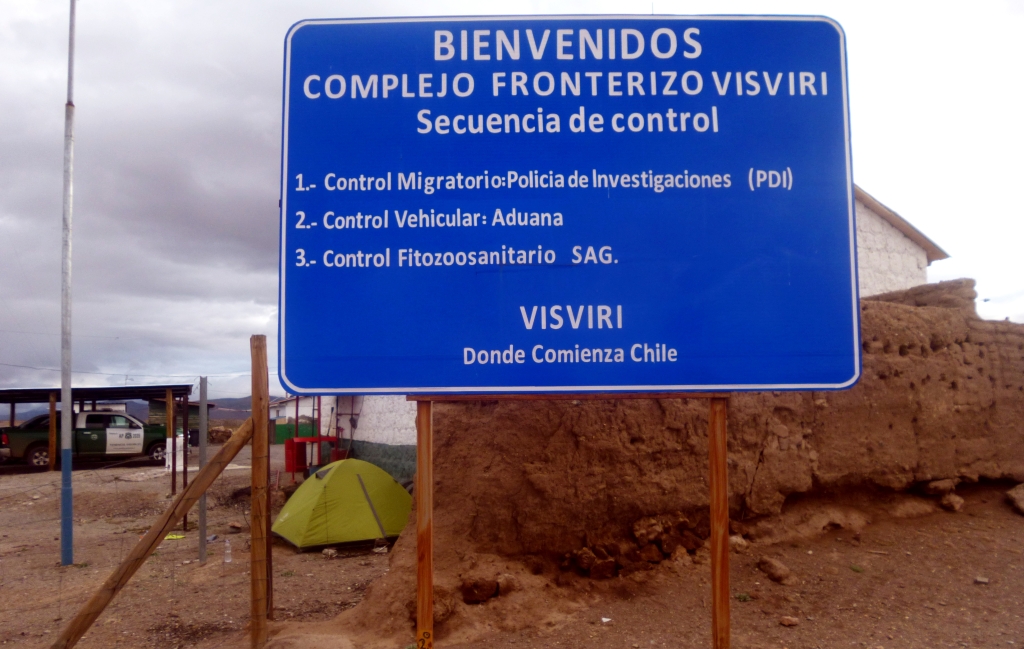
We spent the night camping in the yard outside the police station, and left early before the stronger afternoon winds. We were surprised and delighted to find a perfect asphalt road, which we had almost entirely to ourselves, that took us past wonderful snowy mountain scenery. It was the kind of morning when everything was right, the kind of road that cyclists dream of. For thirty-five kilometres the road was flat and we flew along. At one point Dea spotted what was probably a couple of ostriches running through the scrubland, distinguishable from the llamas, alpacas, and vicunas, by the fact that they only had two legs, and were clearly big fat birds.


After our first break the road began to climb, a series of ups and downs taking us eventually to an altitude of 4,600 metres. But any negative feelings brought on by the taxing workload was overwhelmed with the positive feelings brought on by the incredible scenery we were passing through. The broad vistas under the bright blue sky would have felt spectacular enough anyway, but the addition of twin volcanoes to the skyline, growing bigger and bigger throughout the day, took things to a whole new level of awesomeness. They looked like two Kilimanjaros standing side-by-side, but back in the day when Kilimanjaro had snow on it. We took a million photos and gasped at every new angle of these stunning peaks.
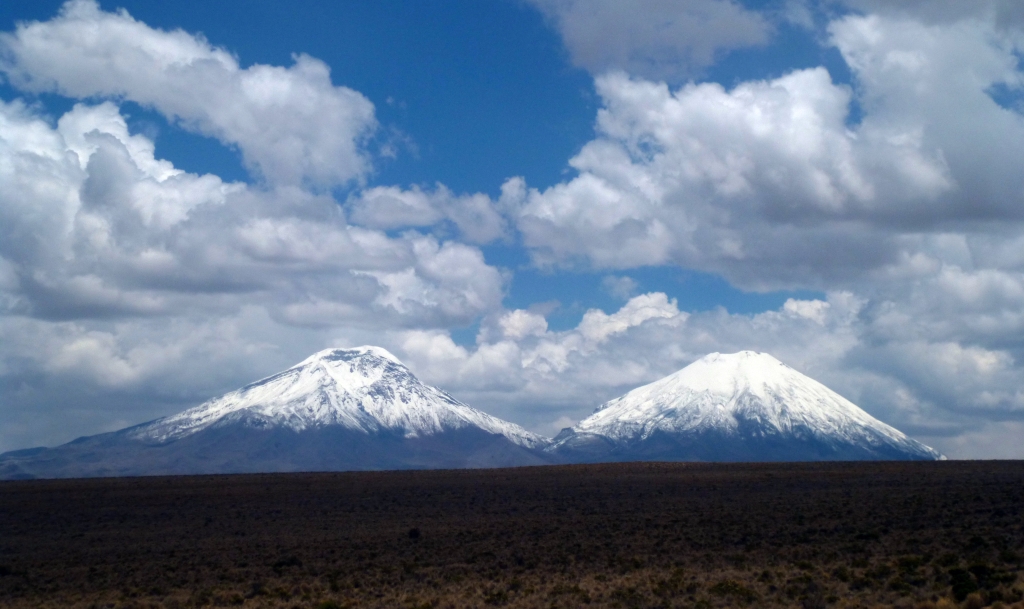



Later in the day the winds picked up, and the going got really quite tough. Along the way we passed a baby llama that was sitting all alone at the side of the road. This was very unusual, for of course the llamas were usually together in herds, and a lone baby was an easy target for any potential predators. Although the llamas around here were often being looked after by herders, they also often weren’t, and we could just make out an untended flock across the plains. Did this young one belong over there? What could we do? We decided that the only reasonable course of action was to try and herd it back to where it belonged, so we laid down our bikes and walked over to try and help.
Creeping up on a baby llama is not, it turns out, a great skill of mine. Before we were anywhere near it, it had jumped to its feet and taken off up the road in the wrong direction, at great speed. I tried to run after it, but this only made things worse, and I was no match for it for speed. All of which would have been bad enough, but was made worse by the appearance of a big truck coming along the road. I was now suddenly terrified that my actions had not only not helped the poor little thing, but were going to contribute to its demise as the truck bore down on it.

Having spent the past six months sharing roads with them I knew South American truck drivers were not, as a rule, the kind of people that liked to slow down for anything. So it was a great surprise and relief to see the brake lights come on and the truck slow to a near standstill, as the llama once again showed off the kind of survival instincts that had no doubt seen it in this predicament in the first place, by weaving in and out in front of the truck. But the driver brought the vehicle to a complete stop, jumped out of his cab, and walked over to the llama. He must have had a much more calm method of approach than me, because the creature allowed him to gather it up in his arms. Man and beast then started walking back down the road towards me. Well, I was now all in with this rescue effort, and I took the llama from the man, the greatest South American truck driver there ever was, and told him I would personally return it to the herd that he himself was now pointing to also. It looked like quite a walk, and the llama was heavier than you might think, but I was just thrilled to have the opportunity to expand our puppy rescuing services into the offspring of other animals.
Well, as you can no doubt imagine, walking across a high Andean plain in Chile with a baby llama under my arm was one of the greatest experiences of my entire life. I thought the two of us were getting on rather well, but as I got closer to the other llamas the young one began to kick out as if it was keen to get on with the reunion by itself. Once I was within maybe 200 metres of the herd I sat it down and let it go, then stood up and watched proudly as it ran off to find its mummy, then watched in despair as it veered off and started running away in the wrong direction.
“NO, NO, you stupid thing!” I shouted, running around and trying to get it to go the right way. This was clearly not an animal blessed with an unusually high IQ. But it did at least then start to move in the right direction again. And then, in a magical moment that, if this was a movie scene (yeah, right), would be enhanced by some inspirational feel-good music, the mother llama spotted her special little one, and ran over to it. For a moment the baby tried to run away, obviously, but eventually the mother llama caught it up, and awww, they were finally properly reunited again, and I can only reasonably assume they lived happily ever after.

We camped that night with an amazing view of the volcanoes, and our luck with the clear weather continued through the next morning too, where we had some more fantastic riding. All of this meant we got some fantastic photos, and it would be remiss of me to do anything other than to show you to them now, so that you can understand how really quite wonderful this place was for cycling.


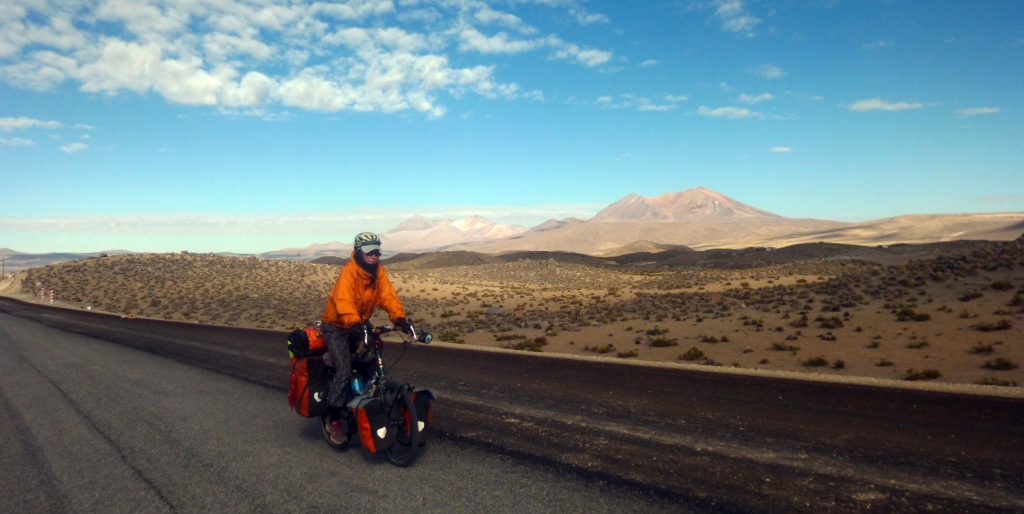


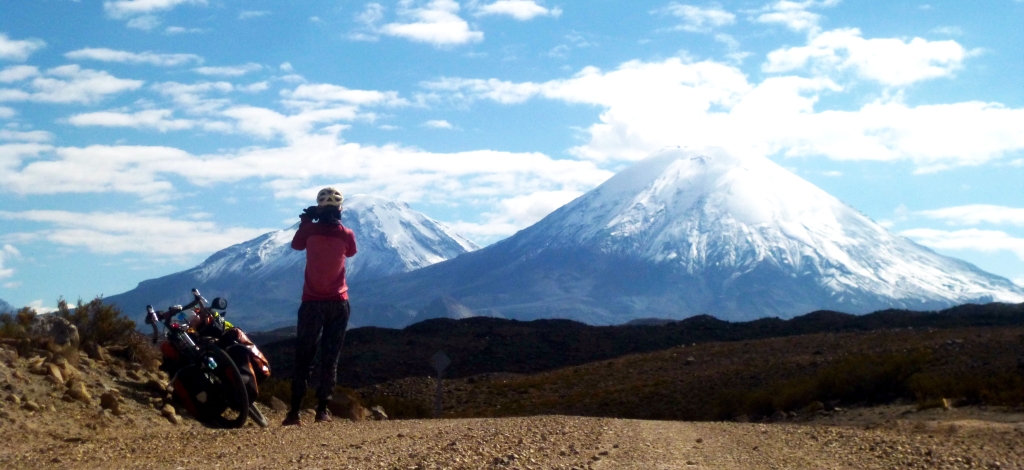
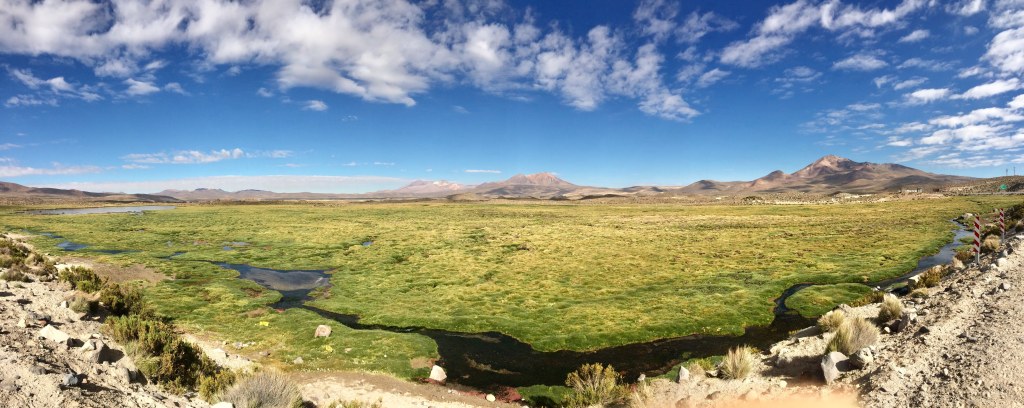

Unfortunately we did then have to join a highway, where there was a considerable increase in the amount of traffic, especially trucks. We wanted to continue up on the altiplano following a dirt road known as the Ruta de Las Vicuñas for several more days of isolation in the mountains, but we first needed to resupply, and to do that we had to descend a thousand metres to the town of Putre, before returning back up again. But it was a surprise on the highway to see how developed Chile really was from the rest areas with nice picnic tables and information boards, the like of which we hadn’t seen since North America. At one of these I leaned my bike against a pole and sat down to pull on an extra layer of trousers. As I bent down to do this I felt a sudden unexpected blow to the head. “Ow!” I cried, looking up to face my assailant. The front of my bike had once again swung around, and the mirror had clobbered me, my life perhaps only saved by the fact I was still wearing my helmet.
“I really think my bike is trying to kill me!”
“I know! What’s going on??” Dea asked, clearly concerned by my bicycle’s repeated attacks.
“I think the new part of the handlebars has made it go psycho. Think about it, that’s its head, it’s basically like having a brain transplant isn’t it?”
“Yeah, I guess so,” she laughed. “Have you tried talking to it?”
“Actually, it hasn’t spoken to me since, you know, the steak knife.”



Putre was a strange little place, a real tourist town, a launchpad for people wanting to come out and see the volcanoes and explore the altiplano. As a consequence accommodation and restaurants were a little pricey, but we were able to get some pretty good supplies in the little shops in preparation for our ride on the remote Vicunas Route. Certainly, it was a much better place to be than Santiago in Bolivia, and we took a rest day to celebrate Dea’s birthday and to recover a little before the physcological challenge of cycling back up a thousand metre climb we’d only just descended. It was also made more challenging by carrying six day’s worth of food, but for some reason in the end the climb turned out to not be too bad, and we were soon back up in the high plains. We turned off onto the Vicunas Route, a washboard dirt road, and after leaving the highway we didn’t see another vehicle all evening. It was nice to be back somewhere so remote, and we found a truly lovely place to camp in the middle of nowhere. It was New Year’s Eve and while people around the world were partying noisily, we sat and enjoyed the complete silence. A year had passed since we’d rung in 2019 in Ahuacatlan, Mexico. It had been a tough year, but a good one. And we were now only a couple of months away from being able to call Latin America a success, a couple of months away from going back to Europe and riding home triumphantly having been around the world, and from starting a new life together in Denmark.
2020, we were quite sure, was going to be a great, great year.
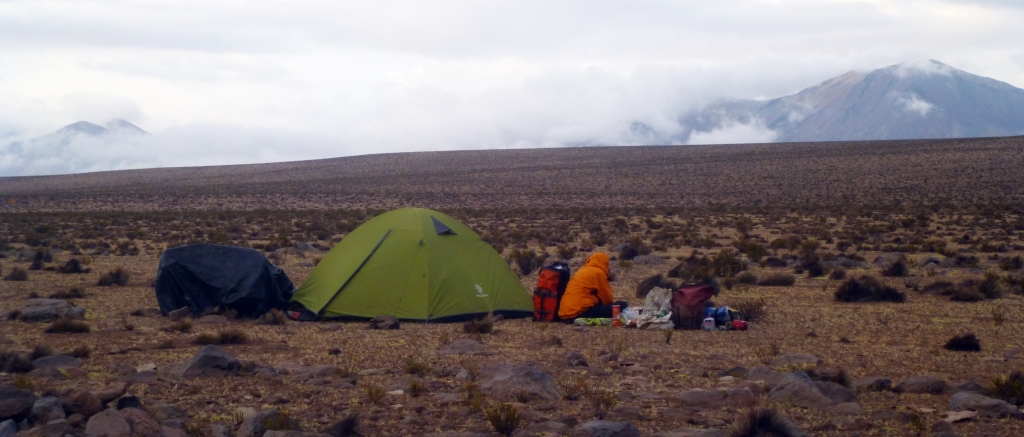
Hey folks,
Amazing Chile photos and as usual a fabulous story! Plus truck-loads llamas etc!!
Dea, I’m pleased you got better relatively quickly, but sounds like it was horrible. Such a trooper 😉
Greetings from Malcolm and I in Sydney.
Looking forward to the entries to come. Your timing for the end of the trip could not have been better?!?!? We were pleased to see on Twitter that you made it home OK after all the adventures. Your write-up will be interesting I’m sure!
I have finally finished the PhD – well handed it in at least – but the big cycle trip we had planned in celebration is off, at least for the moment. Hopefully, however the dust settles, we can be off for 3-4 months in 2021.
Take care both – hope you have found a comfortable place to ‘shelter’.
Catherine
LikeLike
Nice blog entry fella. Nothing better than that type of road and getting friendly with the local geography. ATB for 2020
LikeLike
Hi, Chris. I’m happy you’re both feeling well after all that. I’ve recently finished your two books, and waiting for the third. I’d like to thank you for sharing your stories, they’re a pleasure to read. I think your talent, as a writer, improved over time and chapters. Your ride across Pamir Mountains and your travel in asian winter was thrilling for me, simple reader. What an adventure ! I wish you both the best.
Cheers from Belgium.
Ludovic.
LikeLike